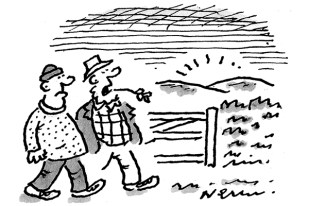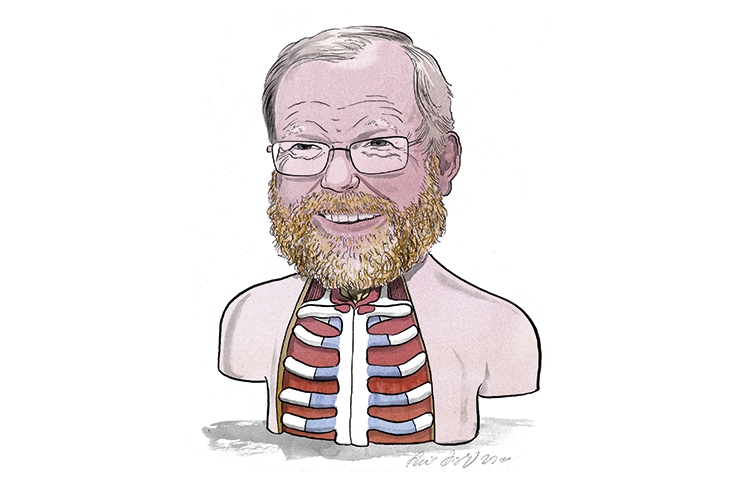‘It’s remarkable that bad things don’t happen to us more often,’ notes Bill Bryson in his latest book, a look at the ‘warm wobble of flesh’ that is the human body. He wrote it long before coronavirus upset the world, but parts of it are particularly relevant now.
Viruses worth their salt know how to get around, writes Bryson. Researchers from the University of Arizona infected a door handle to an office and found it took just four hours for a virus to spread through the building, turning up on virtually every device inside and ‘infecting’ half the workers. Kissing, oddly, is among the least effective ways to spread germs. Ordinary touch is best. ‘A successful virus is one that doesn’t kill too well and can circulate widely.’
I meet Bryson, at his suggestion, in a crypt in central London. I arrive, disorientated by the sepulchral chill of the place, and look around, expecting to find a summery Father Christmas. Instead I find Bryson in an immaculate suit (he’s on his way to the Garrick), eating a sandwich in the crypt café as he studies the Economist. We don’t, of course, shake hands, but nod and smile and toot awkwardly, in an approximation of greeting.
Bryson is something of a rarity: a national treasure, whatever that means, with an American accent. I can’t name a writer who has made me laugh out loud more. The ‘boy from Des Moines’ blew into Britain in 1973 while backpacking through Europe. Footloose and exhilarated to be so far from home — he grew up pining to live somewhere glitzier, like Paris or Chicago — Bryson struck up a friendship with two women working at a psychiatric hospital in Virginia Water, and ‘just impetuously’ decided to get a job there. The whim changed his life.
He met a 20-year-old nurse called Cynthia and fell in love. Forty-seven years on, they are still together and have ten grandchildren. Cynthia is, Bryson tells me with a simplicity that makes my heart twist, ‘the greatest miracle’ of his life. ‘I met her when she was just a girl, and now she is an older lady, and I’m just as fond of her now. We haven’t diverged at all, in all these years.’ When Bryson, now 68, was away for work — shambling across America, investigating the thrills of Bognor Regis — Cynthia was at home raising the children.
Were it not for the hospital job, Bryson believes he would ‘almost certainly’ be working as a copy editor on the Chicago Tribune. ‘Well, actually I would have been made redundant about 12 years ago,’ he says. ‘Life is full of sliding doors. Nothing I’ve done could have happened if I hadn’t had that lucky break in meeting my wife.’

Lucky for the rest of us, too. No doubt the Tribune missed out on a fine copy editor, but so much the better for Britain that Bryson stuck around. His avuncular 1995 travelogue, Notes from a Small Island, became an immediate classic and sold around a million copies. A World Book Day poll named it, I think with justification, the book that best represents England. Even now, Bryson tells me with horror, he gets letters from strangers asking to meet for a gander. ‘They say, “I’m going to be in London in April, I wondered if we could get together.”’
Now, he is trying his best to retire. ‘I am turning down almost everything that comes along,’ he says. ‘What I really want to do is spend more time with my wife, to be around my kids and grandchildren and do things like gardening and walking.’
Bryson didn’t set out to become a bestselling author. Both his parents were journalists and he worked for years in London as a newspaper sub-editor, including for the Times’s business section. As a sub, it fell to him to polish and prune others’ writing; to craft headlines and pounce on crimes against grammar.
There are ghosts of the sub in Bryson’s writing still, which is impeccably researched and lucid. ‘Subbing teaches you to get to the point,’ he tells me. ‘What you learn from reading lots of other people’s writing is “Don’t dick around”. Every story has to have a beginning, a middle and an end.’
As Bryson’s family grew, he picked up freelance writing on the side to pay for ‘prams and washing machines and things’. Meanwhile he felt increasingly ground down by the punishing hours and commute to London from the suburbs. It was in this period that he grew the distinctive gingery beard he has to this day: he realised that if he didn’t shave, he could stay in bed for longer. Would he ever lop it off? He looks aghast. ‘No. It’s been so long that I’m worried about what I would look like. It’s been suggested that I shave the beard off for charity… But I’d rather just give the charity a lot of money.’
‘It’s been suggested that I shave the beard off for charity… But I’d rather just give the charity a lot of money’
Bryson has become fixed in the public’s imagination as limitlessly benign, a Hobbity eccentric from Iowa with a miraculously British sensibility. Yet the myth doesn’t quite fit the man. ‘I’ve always been kind of angry,’ he tells me. What makes him cross? ‘Stupidity. People being selfish. People taking two parking spaces. My wife told me about a woman in the Waitrose in Petersfield piling up her shopping cart with toilet paper. I get angry at that. People who offend against common decency.’
Does the big stuff get him down too — poverty, politics, that sort of thing? ‘I don’t know if anger is the right word. I get dismayed and dispirited by it.’ Though a Remainer, Bryson wasn’t whipped into a frenzy by Brexit. ‘I think Britain is a much, much better place than when I first came here,’ he says. ‘It’s more cosmopolitan and worldly, and I love that. So I was disappointed they voted to leave, but on the other hand… I keep reading these opinion pieces saying Britain shot itself in the head and I think, actually, no. Britain handled Brexit really, really well given that it was such a 50-50 thing. Where are the gilets jaunes? We can disagree ferociously but we are not going to start punching each other. Considering how finely divided the country was, I think it has been pretty civilised. It’s got a little fractious at times but… Look at the Basque separatists. Here, there weren’t any violent protests, we didn’t have to get tear gas out or rubber bullets or anything. Every-body was pretty good about it.’
Bryson’s remarkable equanimity seems to come from his mother, Mary, who died in 2015 at 102. She is portrayed in his memoir, The Life and Times of the Thunderbolt Kid, as almost pathologically nice. ‘Everybody in the world adored my mother,’ he writes. ‘She was entirely without suspicion or malice… She lived to make sandwiches. She wanted everyone to be happy.’
She was a terrible cook — the kitchen was known as the Burns Unit — but affectionate and attentive. The family was, Bryson remembers, ‘radiantly unsophisticated’, and the list of food that never entered the house included pasta, rice, garlic and onions; ‘bread that wasn’t white and at least 65 per cent air’; ‘fish that wasn’t any shape other than rectangular’ and ‘foreign food of any type’.
Bryson’s father — also a Bill — was a slightly darker figure, a baseball journalist who suffered bouts of depression. Did that cloud Bryson’s childhood? ‘It did,’ he says equably. ‘I wasn’t very sympathetic to him, and I still struggle with that. I am one of those people who is in charge of themselves, and my instinct was to say, “For God’s sake pull yourself together. You’ve got a job to do. Don’t tell me you’re too depressed to come to my ball game.” So I was really unsympathetic. I have tried harder to be better.’
The family was ‘never terribly close’ and while Bryson was sad when his parents died, he feels he hasn’t yet been tested by serious loss. ‘I have absolutely no idea how I’d cope with grief. I don’t think I’d be very good at it. I have never lost anybody that was really, really close to me.’
One of the pleasures of his latest book is the delighted astonishment he conveys at the workings of the human body. Bryson reports, thrilled, that we are each made up of seven billion billion billion atoms, and that it would cost more than £96,000 to buy the ingredients for a human body on the open market. The average person sheds half a kilogram of skin flakes in a year, and if their DNA was laid out end to end, it would stretch to ten billion miles, beyond the orbit of Pluto.
The book also revels in all that we do not know about the body: why we dream, why we age, why we have chins. Yet there is a puritanical peevishness that sneaks in too — a distaste for those who do not treat their bodies with due respect. ‘How do we celebrate the glory of our existence?’ Bryson asks. ‘Well, for most of us by exercising minimally and eating maximally.’
I wonder whether part of Bryson’s enduring popularity in Britain boils down to our own amour propre. It is hard not to be flattered by his interest in our sense of humour, in the grottiness of some of our towns and the charm of our villages. ‘The amazing thing about England is that it’s inexhaustible,’ he says. ‘It really is. I can list 50 places I want to go to. I have probably travelled around Britain more than most people but there really is an infinite number of things to see.’
Bryson will have to wait for some time to be unleashed upon his adopted country once again, as we all must. By email, he sends me a Covid update. He says he is worried for his son, a doctor in Nottingham, and for his son-in-law, a policeman in London, but he adds that he is heartened by the ‘lovely sense of community’ springing up around Britain.
‘My wife and I are hunkered down at our home and have never been so happy to have a big, out-of-control garden to keep us occupied. We hate not being able to see our children and grandchildren, but otherwise are strangely content, gardening and reading and going to bed early. I have never felt so springy and virtuous.’ If coronavirus has achieved anything positive, it has been to sequester Bryson with his beloved wife, in a retirement he has found so elusive.
Bill Bryson’s The Body: a Guide for Occupants is published by Doubleday.






Comments